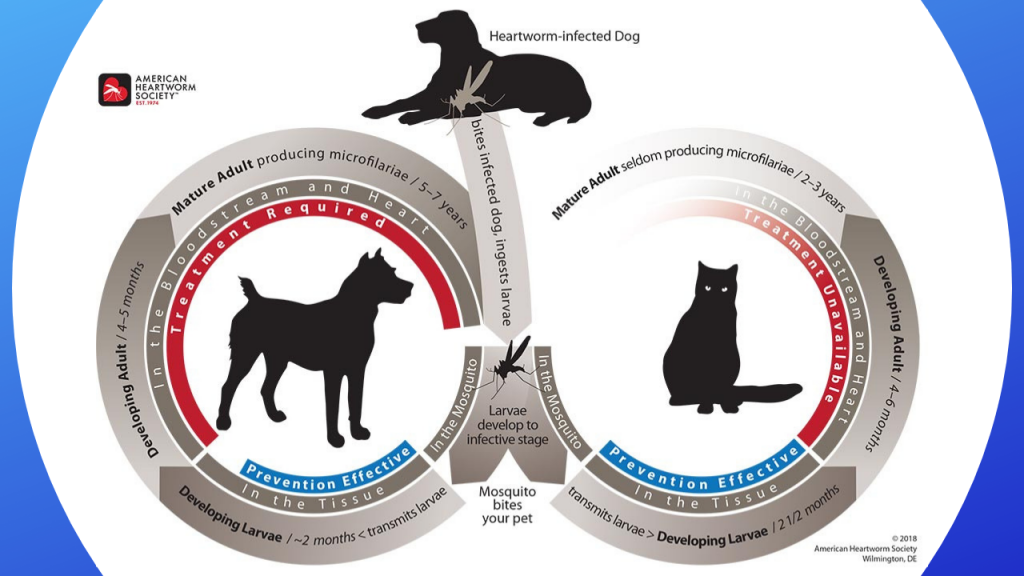 Heartworm disease – is your pet protected? Heartworms are something we unfortunately see a lot – in fact, we have diagnosed four positive heartworm cases in the last 30 days. Why should you be concerned? Because we have found that most pet parents in our community are under educated about Heartworm disease and the threat it poses to their pets. The first largely misunderstood concept about heartworm is that you will see them in your pet’s stool like other common worms and that they are prevented by a dewormer. Heartworms never enter your pet’s gastrointestinal tract and you will never see them in your pet’s stool. For the most part, pets don’t even show symptoms until the infection is very severe, and symptoms of heartworm disease are often overlooked by pet parents. The basic symptoms include coughing, activity intolerance, and lethargy. So, let’s get down to the basics about Heartworms and how the infections occur.
Heartworm disease – is your pet protected? Heartworms are something we unfortunately see a lot – in fact, we have diagnosed four positive heartworm cases in the last 30 days. Why should you be concerned? Because we have found that most pet parents in our community are under educated about Heartworm disease and the threat it poses to their pets. The first largely misunderstood concept about heartworm is that you will see them in your pet’s stool like other common worms and that they are prevented by a dewormer. Heartworms never enter your pet’s gastrointestinal tract and you will never see them in your pet’s stool. For the most part, pets don’t even show symptoms until the infection is very severe, and symptoms of heartworm disease are often overlooked by pet parents. The basic symptoms include coughing, activity intolerance, and lethargy. So, let’s get down to the basics about Heartworms and how the infections occur.
First, heartworms are transmitted through the bite from an infected mosquito and invade your pet’s blood stream. It is estimated that 9 out of 10 mosquitoes in our area are infected with heartworm, and 1 in 63 dogs in Butte County test positive for heartworms (if everyone tested their pets, this number would be substantially higher). Have you ever heard of an outdoor only mosquito? Neither have we, which brings us to another misconception – “My pet doesn’t go outside, so they will never get heartworm.” The reality is, mosquitoes are prevalent in our area and like most pests, do find a way to enter our homes. Once a mosquito has transmitted heartworms to your pet through a bite, the juvenile heartworms stay in their blood stream for 6 months. As they grow into adult worms, they migrate to your pet’s heart and lungs, where they set up camp and live out their days.
If left untreated, they produce offspring and continue to grow in the heart, causing problems like severe lung disease, heart failure, and other organ damage. This disease can be fatal if left untreated. Adult heartworms can live for up to 5 to 7 years in dogs, and 2 to 3 years in cats. The silver lining is that pet’s do not become positive for the disease until the heartworms mature into adults, so if you test your pet and the test is negative, all you have to do is put your pet on heartworm prevention and make sure they stay on it consistently every month to avoid this painful disease all together. Prevention comes in chewable and topical forms and can vary in price from $7.00 to $20.00 a month depending on the prevention you choose to use. If your pet is not on heartworm prevention and becomes infected with worms that mature to adulthood and invade their heart and lungs, the treatment is much more involved than just providing an inexpensive monthly pill; it takes several months, antibiotics, steroids and a few painful injections to kill the adult worms. The national average cost to treat a heartworm infection on a positive dog is $1500.00 and there is no treatment available for cats, only supportive care for the secondary conditions that arise. We can’t stress enough the importance of monthly prevention to avoid the pain for your pet and the cost of caring for a heartworm positive pet. If your pet has never been tested for heartworm, or has not been consistent on their heartworm prevention every month, it’s time to test and start prevention. Don’t wait and let your pet become a statistic. Contact our Clinic today! 530.343.7917 x 201.